Monday 7 September 1964 on Southern
In depth into Southern Television’s schedule for Monday 7 September 1964
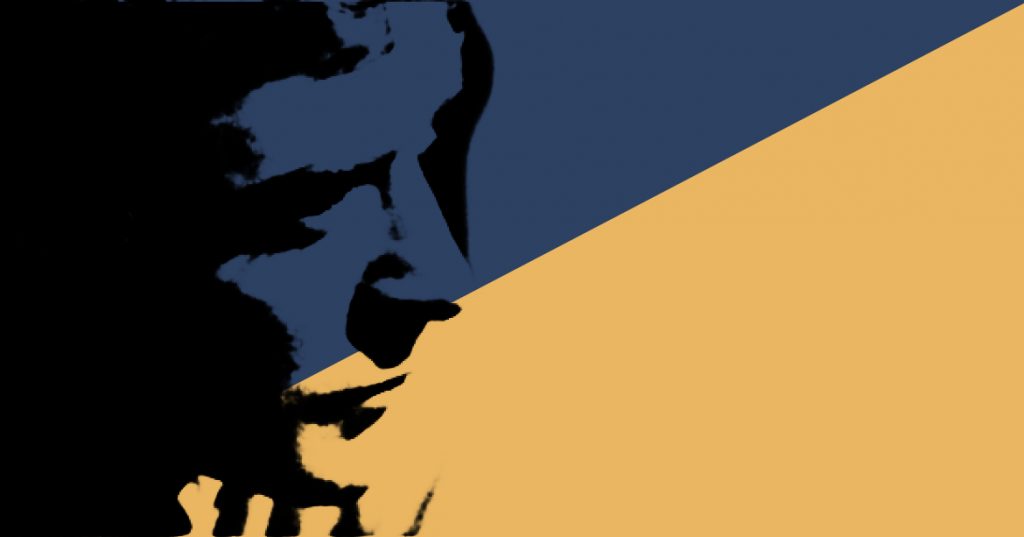
Day by Day, Southern’s regional magazine, is about to be split at the ITA’s recommendation to serve the south and the south-east. The Dover transmitter had opened in January 1960, allowing Southern to sell separate adverts between the two halves of its region. But the contract renewal in 1964 had seen the ITA require Southern to do more with the area. The requirement was based on what the ITA saw as the success of turning the North and West Wales and the South Wales and West England contracts into the unified Wales and West England region upon the demise of Wales (West and North) Television and the absorption of its Teledu Cymru service into neighbouring TWW. This created the first ‘dual region’, with one company providing two services. As time passed, the Authority became more and more convinced that this was the way to run the network, culminating with officially splitting the south into a dual region in 1982 and reforming ATV into the new dual Central at the same time. Had ITV not been effectively privatised in 1991, the by-then IBA may well have looked to splitting Yorkshire along the north and west/south and east transmitter divide; they had encouraged Tyne Tees to provide at least an opt-out for the south of their region, which became a full-blown if short-lived separate news service in 1993 after TTT won its contract renewal.
The south-east programme was named Scene South East, but ran only on Wednesdays and Fridays from Friday 9 October 1964. Southern argued that there just wasn’t enough news for a 5-day opt-out; the real reason was that they were not convinced that there was enough money in it for them, given the costs of expanding Dover to a full news operation. Far cheaper to use the existing resources at Southampton.
It’s easy to talk up the rivalry between the BBC and the ITV companies based on some one-off events. For instance, Simon Dee being poached by London Weekend is said to have seen the BBC swearing to never hire him again. The reality was more that his prima donna status, his burning of his BBC bridges and the massive flop of his LWT show just made him unhireable. But that is taken as the default: jump ship from one side to the other and you can never go home again.
This, of course, isn’t true, as can be seen by Day by Day being hosted by Tony Bilbow on Monday through Wednesday. He at this point was one of the big names on BBC-2, a host of Line-Up, and yet he’s perfectly able to divide his time between Southampton and Shepherd’s Bush. Similarly, women’s programme Home at Four-Thirty, the predecessor to the dreadful Houseparty, on Tuesdays through Thursdays is hosted by Joan Bakewell, another BBC-2 Line-Up face. Don Moss, the Day by Day presenter on Thursdays and Fridays, was even better known to viewers from his popular BBC Light Programme slot and the Phillips programme on Radio Luxembourg.
6.45pm sees Sports Desk, Southern’s local sport and results programme. The presenter is Richard Davies, who would be recruited by ABC for their new World of Sport programme in January 1965 as deputy to Eamonn Andrews, becoming the lead presenter, as Dickie Davies, when LWT took over the show in 1968 and Andrews moved to Thames. His deputy would then be another Southern face: Fred Dinenage.
The networking set-up at ITV had handed control of the peak time schedules to the Big 4 – Rediffusion, ATV, Granada, ABC. The other companies were free to drift from this – and often did – but it was cheaper and more technologically convenient to stick with the Big 4’s prime time offerings. However, that same system limited the ambition of what were known internally as the ‘major minors’ in ITV – Southern, Anglia, TWW and Scottish. They all had bright ideas for network programming, but had few slots available to them. To get round this, the major minors arranged a network-within-a-network, swapping programmes that they had made that were of more than local interest, allowing them to preempt the Big 4 and assert their independence. Perhaps the most famous of these is at 7pm on Southern: TWW’s pop show Discs a Gogo. The Big 4 were not interested in another pop show, having Ready Steady Go! for weekdays and Thank Your Lucky Stars for weekends, but it was popular enough fare for Southern, Anglia and Scottish to take it, either direct from TWW or time shifted. Another example of this is TWW’s Mr & Mrs, exchanged between the major minors; it also had a version produced by Border which was shown by the remaining small companies.
The play from Granada at 8pm and 9.10pm is sufficiently important to ITV to get the cover of the TVTimes, a picture spread on page 3, a feature in the ‘Playbill’ section and a boxout taking most of the third page for Monday 7 September. This was the beginning of British alternate or counterfactual history accounts of the Second World War concentrating on what might have happened had Britain been defeated or capitulated during the period we ‘stood alone’ (with the rest of the Empire and Commonwealth, so not quite all that alone) between the fall of France and Pearl Harbor.
This play was being shown at almost the same moment that It Happened Here was debuting at the Cork Film Festival, the production of the two having co-incidentally overlapped. It Happened Here would not go on to general release until 1966, however, making The Other Man the first mass-market production of this type. Like It Happened Here, the play is set now – 1964 – with Britain having fallen to the Nazis in 1940. Michael Caine is lead character and also provides the framing device: a soldier, he attends the opening of a military museum and begins to daydream about what his life would’ve been like under Nazi occupation. He sees himself making repeated compromises with fascism until he can no longer live with himself. He tries to get himself killed by Soviet forces, but succeeds only in being torn to pieces. He is reassembled using skin, limbs and organs harvested from live concentration camp inmates and celebrated as a hero of the Third Reich. The play ends with the Nazi version and the ‘real’ version of him making almost the same speech at the same military museum opening.
The play is unusual for having been shot on videotape even for the outside scenes – something technically difficult to do in these early days of reel-to-reel videotape – to avoid the jarring change between studio video and outside film quality. Unfortunately, this has pretty well doomed the play: it had an evens chance of surviving on film, but on videotape was a prime candidate to be wiped later. All that survives in the archives of the 2 hours and 20 minutes (including commercials) is about 80 minutes divided between the start and end.
The Other Man typifies Granada of the era – ambitious, tackling an unusual subject, using new techniques for the filming, and splashing money on a cast of 200 with 60 speaking roles simply because of the importance of the piece to ITV and to British culture. The two other main play-making companies, ABC and Rediffusion, are made to look staid and conformist in comparison – Rediffusion’s The Lover of 1963 notwithstanding. All in all, this is a programme that only Granada could have made, which is the highest compliment to the Northern weekday ITV contractor one could make.
The programme at 10.35pm sounds absolutely terrible, but actually has some good at its heart. In 1964 the feminist movement was simply not heard and the status of women, which had fallen to a 20th century nadir in the 1950s, was never thought to be discussed. Even socially conscious ABC was avoiding the subject whilst happy to talk about racism, divorce and abortion. The idea of equal rights for women was something almost nobody was thinking about. Southern’s programme, Up the Poll, asks “does more independence make women less feminine?” but this is a trojan horse for letting someone say the truth out-loud on air: that it doesn’t matter either way and ‘feminine’ is no measure for anything. This is perhaps let down by the coupon asking readers of the TVTimes to vote on the question – no good ever comes of these types of self-selecting polls. The question as to whether the programme changed anyone’s mind is interesting, but the poll will be weighed down with people voting without watching it and without knowledge, making the results pointless.
In another example of blurring the boundaries between the BBC and ITV, the compere of Up the Poll is Leslie Dunn, better known to audiences then as Paul Johnson, husband of Christine Archer, in BBC radio’s The Archers.
Granada’s All Our Yesterdays is at 7pm on most of the network but bumped to the specific time of 11.07pm on Southern. The programme looked back 25 years ago that week – which is the equivalent of us looking back to 1993 now – and this week is a special edition, marking a quarter of a century since the outbreak of World War II. Instead of newsreel clips linked by Brian Inglis, Granada invites people with memories of the war to come in, which at this time is basically everybody over the age of 30. Indeed, anybody over the age of 43 – just into middle age – had been in the forces or doing war work at home, whilst anybody in the major cities aged 25 or over had experienced an air raid, even if they were too young to remember it. It’s worth remembering that ITV had only been running 9 years by this point, and its beginning in 1955 had happened whilst some pharmaceuticals – including Ribena – were still under wartime control orders and required coupons as well as money to buy; meanwhile production of cheese was still under government direction and was often hard to find, officials preferring to make sure domestic milk by the pint was in good supply.
About the author
Kif Bowden-Smith is the founder of the Transdiffusion Broadcasting System. Russ J Graham is the editor-in-chief.

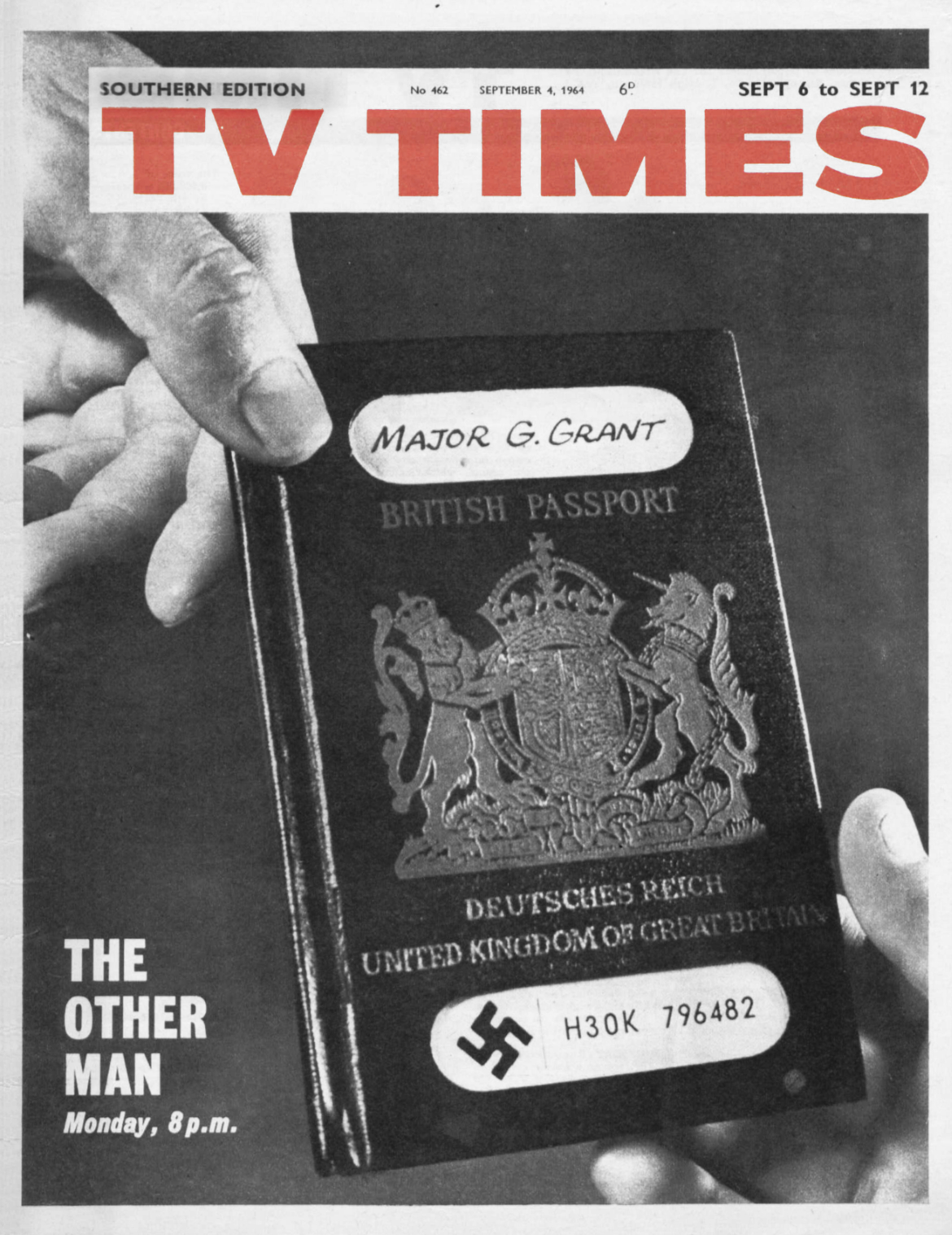
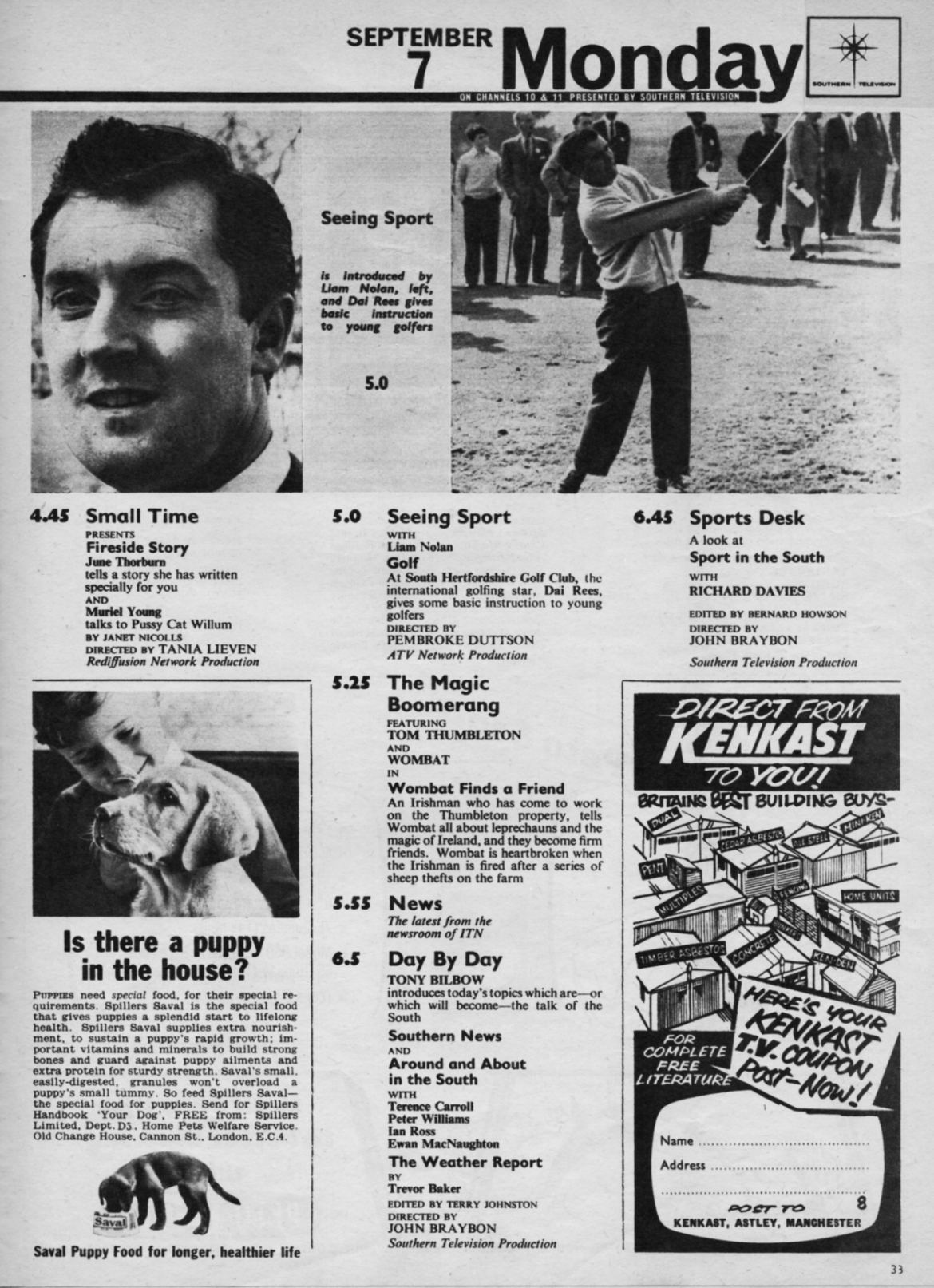

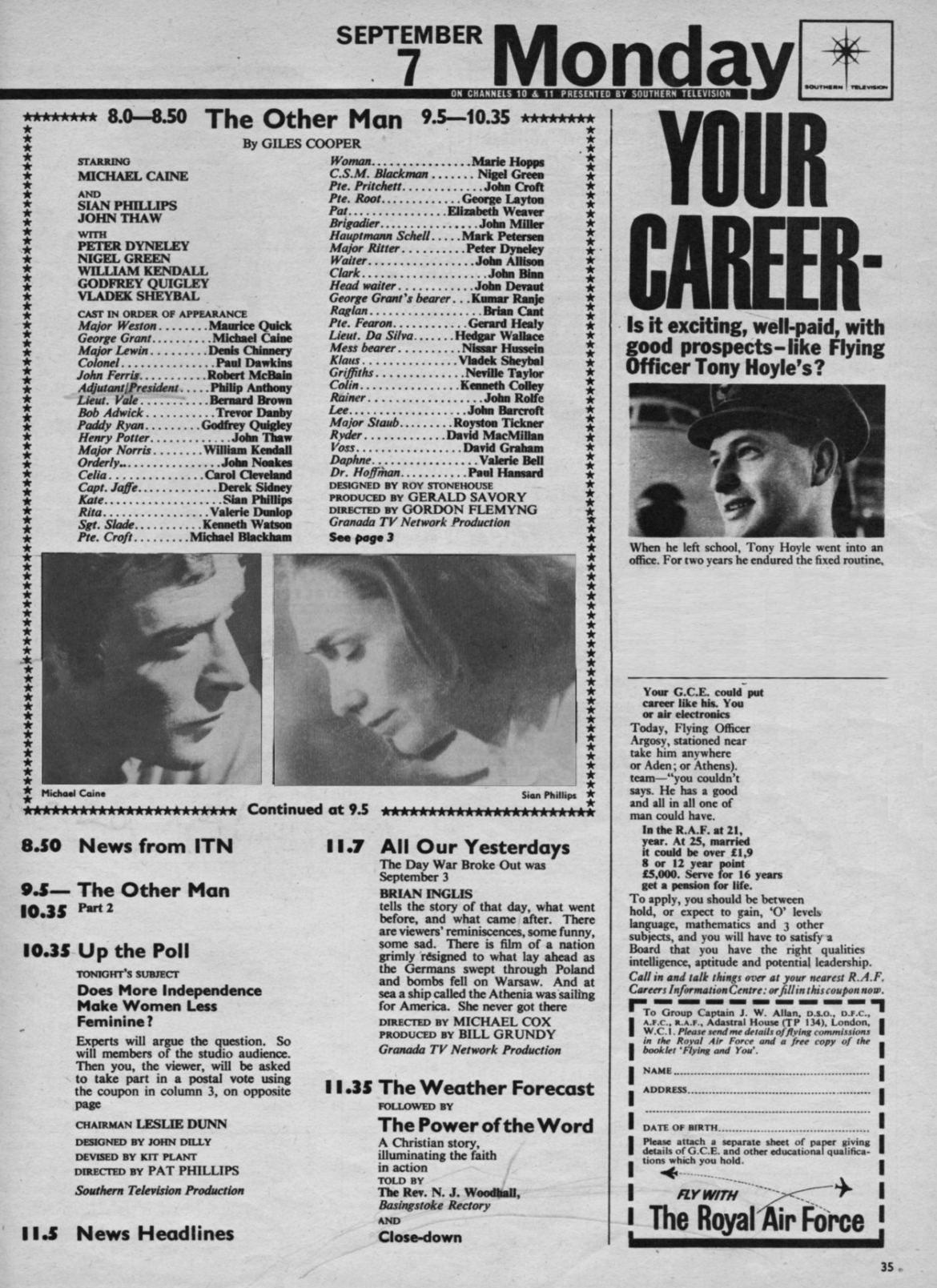
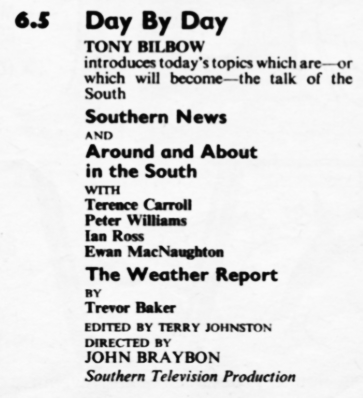

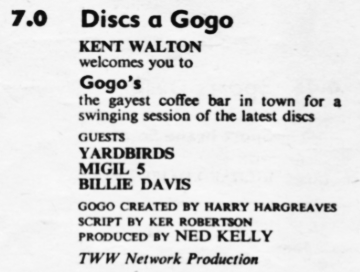
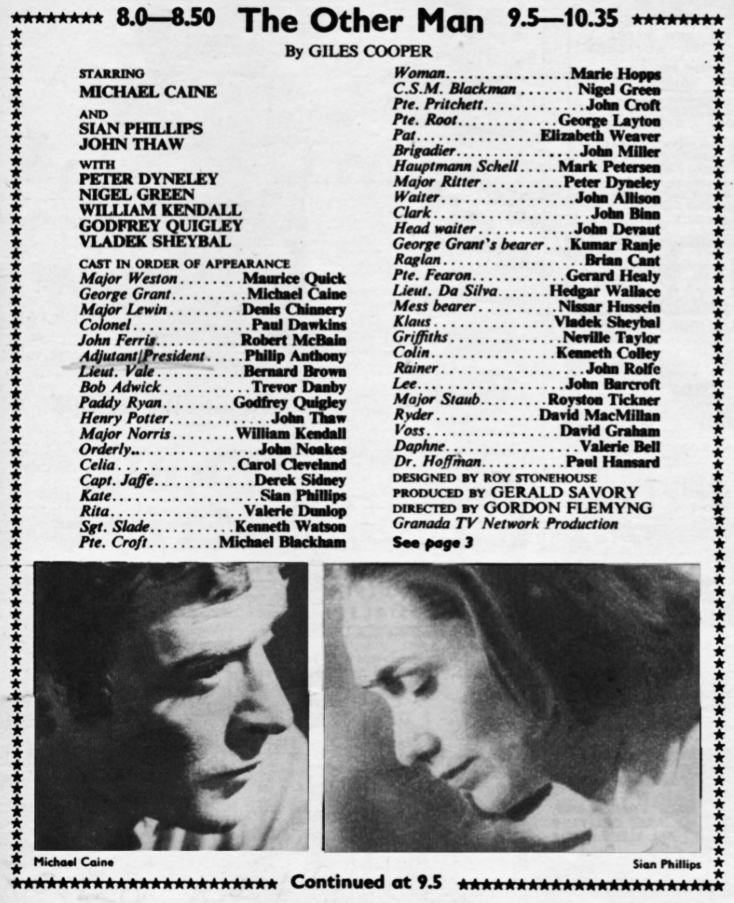

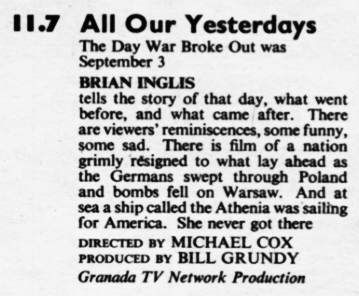
What a line up in The Other Man-it included two actors who became legends on BBC children’s tv-John Noakes and Brian Cant,plus two actors who the following year were voice artists in Thunderbirds-Peter Dyneley and David Graham
And I would assume that some British schoolboys coming across the listing for “Discs a Gogo” would be laughing like Beavis and Butt-Head over the description of the setting as “the gayest coffee bar in town.”
Don’t forget the young John Thaw a decade before the Sweeney.